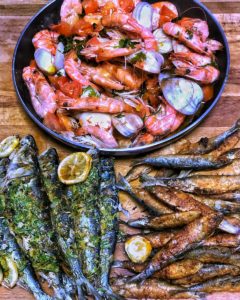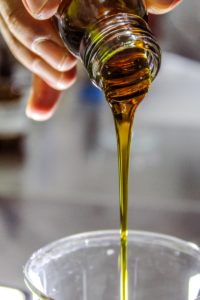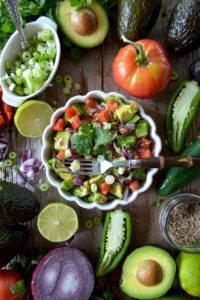Many women 40 years old and older may choose a Low carb Mediterranean diet plan to control their blood sugars. Learning the concepts and basics of the Low carb Mediterranean diet plan will make it easy to incorporate into their daily routine.
What is the Low Carb Mediterranean Diet Plan?
A low-carb Mediterranean Diet Plan is low in sugar and low in starchy carbohydrates but is loaded with healthy nutrients. Potatoes, corn, peas, and winter squashes are examples of starchy vegetables. Whole grains are part of the starchy carbs. Too many carbs can cause blood sugars to be out of control and lead to inflammation.
Nonstarchy vegetables are the meals main component. They come in a variety of colors. Every meal contains healthy protein and healthy fats. Seafood and plant-based foods are the preferred protein instead of red meat. Olive oil or avocado oil are the preferred oils in the diet. Avocados and nuts are healthy fats. Whole grains and starchy vegetables are limited in this diet plan. Therefore the Low Carb Mediterranean diet plan limits the use of potatoes, corn, and winter squashes.
How does one start the Low Carb Mediterranean Diet Plan
Here’s how you can get started with Low Carb Mediterranean Diet Plan. Make a list of foods that you like that fit into the Low Carb Mediterranean Diet Plan. The amount of carbs for this diet plan is between 100 – 150 Gms per day. This translates into three 1/2 cup servings per day.
The majority of the meals comprise of nonstarchy vegetables such as kale, assorted greens, radishes, tomatoes, bell peppers (all colors), mushrooms, yellow squash, zucchini, carrots, and cabbage.
Nonstarchy vegetables are classified as carbohydrates but they are not restricted. They are very low in calories. The benefit of using nonstarchy vegetables is the fiber they contain. The fiber in the vegetables promotes fullness, helps to improve digestion, control blood sugar, and improve gut health.
What kind of Protein Is Recommended?
Seafood, eggs, and plant protein are recommended for main protein choic es. The seafood recommendation is to use wild-caught coldwater fish, such as salmon, mackerel, tuna, or sardines. These seafood types contain Omega-3 which is a healthy fat. People are advised to decrease red meat in their meals because they contain saturated fat.
es. The seafood recommendation is to use wild-caught coldwater fish, such as salmon, mackerel, tuna, or sardines. These seafood types contain Omega-3 which is a healthy fat. People are advised to decrease red meat in their meals because they contain saturated fat.
Farm-raised fish is to be avoided because of possible contaminants. Other protein options include beans, protein powders, and soy products. One word of caution about the use of beans. They contain significant amounts of carbohydrates. So check your blood sugar to see how your body responds. Some examples of beans are lentils, chickpeas, black beans, and red beans.
 What type of fats are allowed on the low-carb Mediterranean Diet Plan?
What type of fats are allowed on the low-carb Mediterranean Diet Plan?
The Low carb Mediterranean meal plan emphasizes the use of extra virgin olive oil (EVOO). But all olive oils are not created equal. Women 40 years old and older need healthy fats to help keep the skin smooth. It’s important to use good quality olive oil. EVOO is the preferred oil and it must be in dark-colored bottles because light exposure can damage the oil. Good quality oil is produced in one place, not a blend of oils from different locations. So check the label to see where the oil was produced. You can also see when the oil was pressed. That will give you an idea of how long the bottle has been sitting. A good quality EVOO is green because it is the first pressing of the olives. The same is true for a good quality avocado oil. Both EVOO and avocado oil are used to provide healthy fats for the body to provide components to build cell walls, nourish brain cells, and help the body produce hormones. It is best to buy the oils in the quantity that can be used before going rancid.
Other healthy fats include nuts, avocados, and coconuts. Almonds, walnuts, pecans, cashews are examples of healthy nuts. Avocados are a fruit that is mostly fat and fiber. Fat provides flavor to food and provides satiety and makes one feel fuller longer.
Know how to identify highly processed foods
Other oils that are commonly used but not recommended are canola, sunflower, safflower, corn, and vegetable oil. These are considered industrial or manufactured oils. They promote inflammation in the body and can cause problems with cholesterol. Abnormal cholesterol increases the risk for heart disease and inflammation. Inflammation does increase the risk of type 2 diabetes, some cancers, arthritis, and other autoimmune conditions. Another word of caution is about the use of highly processed foods such as packaged or boxed foods. This includes bottled dressings. Look at the ingredient labels to see what the first 4 ingredients are. Processed foods usually contain manufactured oils, i.e. soybean or partially hydrogenated oils, a large amount of sodium (salt), and added sugar (high fructose corn syrup) or other types of sweeteners. These unhealthy ingredients increase the risk of chronic health problems. The healthy nutrients, such as vitamins, minerals, and fiber have been removed. These products tend to be full of calories but lack nutrients. Consuming these foods makes it more difficult to control blood sugars and blood pressure.
“No food is off limits but you should limit foods that do not help you reach your goal.” I discovered how effective the low-carb Mediterranean diet plan was with my family. My son and daughter-in-law adopted this plan along with regular exercise. My daughter-in love’s A1C went from 14.2 to 6.4 in six months. Her insulin dosage has been drastically decreased and she feels so much better.
Please note that no food group was eliminated. The use of fried foods, sugar-sweetened beverages, and highly processed foods is decreased. The low-carb Mediterranean diet plan is one method that can be used to control blood sugars and blood pressure. Great side effects include weight loss, increased energy, and improved sleep.
So do you know where to start? I want to invite you to set up a 15-minute call to see which plan will work for you.



Recent Comments